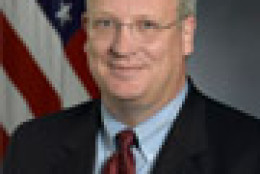Defense Department
-
"Inside the DoD's Reporter's Notebook" is a bi-weekly feature focused on news about the Defense Department and defense community as gathered by Federal News Radio DoD Reporter Jared Serbu. Submit your ideas, suggestions and news tips to Jared via email.
June 02, 2014 -
The debate to change the Army's force structure is switching focus from "should they do it" to "how." One strategy is a Commission on the Structure of the Army. Frank Hoffman, a senior research fellow at the Institute for Strategic Studies at the National Defense University, tells In Depth with Francis Rose a commission would be a big step backwards in the effort to make the Army more affordable.
May 30, 2014 -
The comply-to-connect initiative is about removing much of the people challenges by automating the software patching and updating the cyber processes in real time.
May 30, 2014 -
Rob Carey, who recently retired after 31 years in government, said the government must focus on identity management and information assurance as computer threats become more complex and sustained.
May 29, 2014 -
Under a construct that's still under discussion, the Defense Information Systems Agency would take charge of some portion of DoD's cyber defenses under a new Joint Force Headquarters.
May 29, 2014 -
Congress is hollowing out the Defense Department and turning the nation's military into a paper tiger of global proportions. That's according to Bryan Clark, a senior fellow at the Center for Strategic and Budgetary Assessments and a former special assistant to the Chief of Naval Operations. He joined In Depth with Francis Rose for Pentagon Solutions today. He and his colleague Todd Harrison write about the Defense Department's fiscal 2015 budget process on Capitol Hill and how it forces the Pentagon to ignore its own budgetary wisdom.
May 28, 2014 -
The Professional Services Council has launched a new initiative to focus on technology policy. It's picked a defense insider to lead it. Dave Wennergren served in the Defense Department until 2013 when he joined the contractor CACI. He joined Tom Temin and Emily Kopp on the Federal Drive to discuss the latest chapter in his career.
May 28, 2014 -
DARPA launches its latest challenge program next week. It's called the Cyber Grand Challenge, and its goal is to completely transform the way computer network defense works. Over the course of two years, teams will try to build automated systems that can find and fix cybersecurity vulnerabilities so quickly that even the best human hackers in the world can't defeat them. Michael Walker is a former hacker who's now the program manager for DARPA's latest challenge. He talked about it with Federal News Radio's Jared Serbu during a demonstration day at the Pentagon last week.
May 28, 2014 -
Judging from the Defense authorization bills that have passed the House and been marked up in the Senate, Congress seems to have made a hash out of Pentagon plans to meet its budgetary goals. Todd Harrison is a senior fellow at the Center for Strategic and Budgetary Assessments. He joined Tom Temin and Emily Kopp on the Federal Drive to help sort out the reality of where Defense spending is headed and who will benefit.
May 27, 2014 -
In a repeat performance from last year, the House has included a major IT procurement reform plan as part of the 2015 Defense Authorization bill. Last year it got removed in conference. But this year a similar bill is rattling around the Senate. Plus, there have been some changes in the content of the House version. Trey Hodgkins is senior vice president for the public sector at the Information Technology Industry Council. He joined Tom Temin and Emily Kopp on the Federal Drive to discuss the significant changes made in this year's version of FITARA.
May 27, 2014 -
The Defense Department has spent years on a blueprint for what it says will eventually become a single, standards-based IT environment. Federal News Radio DoD Reporter Jared Serbu says the department expects to have all the technical standards on paper by the end of the year. Read Jared's related article.
May 27, 2014 -
DoD's Joint Technical Synchronization Office is still working through thousands of comments from hundreds of engineers across the military, but the department is hoping to have a solid technical framework for the Joint Information Environment in place by the end of this year.
May 27, 2014 -
When it comes to adopting mobile computing, the Defense Department moves about as fast as a Sherman tank in the mud. It wants to get things just right so mobile devices don't compromise network security. One hurdle for software vendors is the Security Technical Implementation Guide, or STIG. Without it, their stuff can't be used on DoD networks. Airwatch makes mobile device management software, and it just received STIG certification. Founder Alan Dabbiere joins the Federal Drive with Tom Temin and Emily Kopp to explain how the process works.
May 23, 2014 -
The House passed its version of the annual defense authorization bill Thursday, while the Senate's is still a work in progress. Both versions mostly shun DoD's proposals to cut costs during sequestration.
May 23, 2014 -
The Cyber Grand Challenge, set to launch for the first time two weeks from now, aims to encourage the development of computing systems that can seek out cybersecurity weaknesses better than humans can.
May 22, 2014









